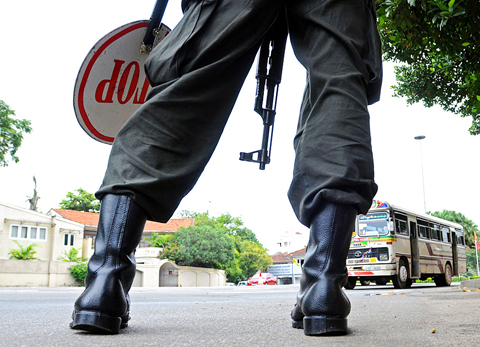Accusations that Pakistan helped a militant group bomb India’s embassy in Afghanistan cast a cloud yesterday over the start of an eight-nation South Asian summit aimed at fostering regional cooperation.
India, Afghanistan and Sri Lanka, all fighting decades-old insurgencies, exhorted South Asian nations yesterday to pool efforts to fight terrorism, which they said posed the biggest threat to the region’s stability.

PHOTO: AFP
‘GREATER GRIP’
“Terrorism and its sanctuaries are gaining a greater grip in Pakistan,” Afghan President Hamid Karzai said in a speech at the start of the two-day summit.
He said terrorists in Pakistan were getting “institutionalized nurturing and support.”
Afghanistan was the worst victim of international terrorism, Karzai said.
Indian Prime Minister Manmohan Singh said the recent attack on his country’s embassy in Kabul and a string of bombings in Indian cities “are gruesome reminders of the barbarity that still finds a place in South Asia.”
“It remains the single biggest threat to our stability,” he said.
ACCORD
The summit is expected to approve an accord on fighting terror, including freezing funds used for attacks and agreements on the creation of a regional development fund and a food bank aimed at coping with skyrocketing food prices.
Tensions between India and Pakistan have heightened amid accusations that members of Pakistan’s intelligence service have aided Islamic militants fighting in Afghanistan and the Indian portion of Kashmir.
The New York Times reported on Friday that US intelligence agencies had intercepted communications between Pakistani intelligence officials and Islamic militants implicating the intelligence service in the July 7 attack on the Indian Embassy in Kabul, which left at least 41 people dead.
Pakistan dismissed the accusation as “rubbish” and promised to cooperate with neighboring countries to combat terror.
WORST OFF
Pakistani Prime Minister Yousuf Raza Gilani said yesterday that his country had suffered the most from terrorism, though it was afflicting all countries of the region.
The summit is being attended by leaders from Afghanistan, Bangladesh, Bhutan, India, the Maldives, Nepal, Pakistan and Sri Lanka.
The region, home to one-fifth of the world’s population and many of its most impoverished people, has been plagued by terror attacks.
Pakistan is grappling with restive tribal regions along its border with Afghanistan, where fighting between insurgents and government troops intensified this week.
TALIBAN
The Afghan government is facing a resurgent Taliban and a spate of bombings has hit India in recent weeks.
Afghan officials have repeatedly said Pakistan is not doing enough to crack down on militants, an allegation which Pakistan denies.
The South Asian Association for Regional Cooperation was set up in 1985 to promote economic cooperation, but progress in most areas has been slow, mainly because of the rivalry between India and Pakistan, and the organization has often been derided as little more than a talk shop.
Also See: Fighting breaks out ahead of regional summit in Colombo

BUILDUP: US General Dan Caine said Chinese military maneuvers are not routine exercises, but instead are ‘rehearsals for a forced unification’ with Taiwan China poses an increasingly aggressive threat to the US and deterring Beijing is the Pentagon’s top regional priority amid its rapid military buildup and invasion drills near Taiwan, US Secretary of Defense Pete Hegseth said on Tuesday. “Our pacing threat is communist China,” Hegseth told the US House of Representatives Appropriations Subcommittee on Defense during an oversight hearing with US General Dan Caine, chairman of the Joint Chiefs of Staff. “Beijing is preparing for war in the Indo-Pacific as part of its broader strategy to dominate that region and then the world,” Hegseth said, adding that if it succeeds, it could derail

CHIP WAR: The new restrictions are expected to cut off China’s access to Taiwan’s technologies, materials and equipment essential to building AI semiconductors Taiwan has blacklisted Huawei Technologies Co (華為) and Semiconductor Manufacturing International Corp (SMIC, 中芯), dealing another major blow to the two companies spearheading China’s efforts to develop cutting-edge artificial intelligence (AI) chip technologies. The Ministry of Economic Affairs’ International Trade Administration has included Huawei, SMIC and several of their subsidiaries in an update of its so-called strategic high-tech commodities entity list, the latest version on its Web site showed on Saturday. It did not publicly announce the change. Other entities on the list include organizations such as the Taliban and al-Qaeda, as well as companies in China, Iran and elsewhere. Local companies need

CRITICISM: It is generally accepted that the Straits Forum is a CCP ‘united front’ platform, and anyone attending should maintain Taiwan’s dignity, the council said The Mainland Affairs Council (MAC) yesterday said it deeply regrets that former president Ma Ying-jeou (馬英九) echoed the Chinese Communist Party’s (CCP) “one China” principle and “united front” tactics by telling the Straits Forum that Taiwanese yearn for both sides of the Taiwan Strait to move toward “peace” and “integration.” The 17th annual Straits Forum yesterday opened in Xiamen, China, and while the Chinese Nationalist Party’s (KMT) local government heads were absent for the first time in 17 years, Ma attended the forum as “former KMT chairperson” and met with Chinese People’s Political Consultative Conference Chairman Wang Huning (王滬寧). Wang

CROSS-STRAIT: The MAC said it barred the Chinese officials from attending an event, because they failed to provide guarantees that Taiwan would be treated with respect The Mainland Affairs Council (MAC) on Friday night defended its decision to bar Chinese officials and tourism representatives from attending a tourism event in Taipei next month, citing the unsafe conditions for Taiwanese in China. The Taipei International Summer Travel Expo, organized by the Taiwan Tourism Exchange Association, is to run from July 18 to 21. China’s Taiwan Affairs Office spokeswoman Zhu Fenglian (朱鳳蓮) on Friday said that representatives from China’s travel industry were excluded from the expo. The Democratic Progressive Party government is obstructing cross-strait tourism exchange in a vain attempt to ignore the mainstream support for peaceful development